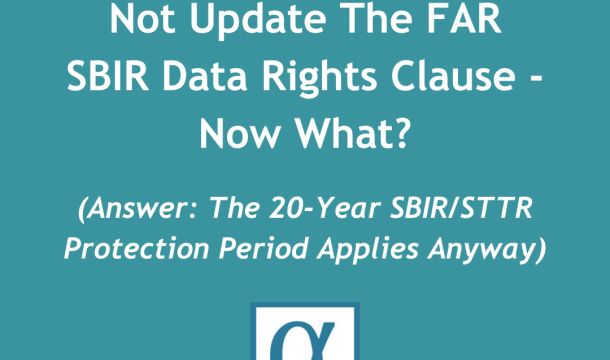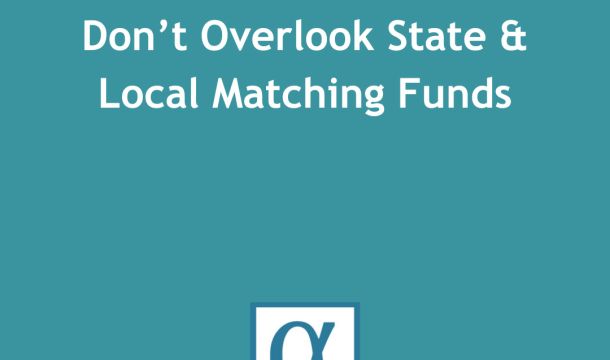The GovCon Bulletin™
A Closer Look At The SBA’s Final Rule On WOSB Certifications
Earlier this month the U.S. Small Business Administration (SBA) published its long-awaited final rule covering the certification requirements for Women-Owned Small Business Concerns (WOSBs) and Economically Disadvantaged Women-Owned Small Business Concerns (EDWOSBs). In that rule, the SBA also took the opportunity to make changes to align the dollar threshold for economic disadvantage under the 8(a) Business Development Program with the dollar threshold for economic disadvantage that applies to EDWOSBs.
WOSB Certifications
As we wrote about here, in September 2015, the SBA issued a final rule that implemented the 2015 NDAA changes to the Small Business Act granting contracting officers the authority to make sole source awards to WOSBs and EDWOSBs. Although the 2015 NDAA changes also created a requirement that businesses be certified as a WOSB or EDWOSB by either a federal agency, a State government, the SBA, or a national third party certifier (TPC) approved by the SBA, the SBA did not implement this requirement in its 2015 final rule, believing that such implementation would delay implementation of WOSB sole source authority.
Nearly five years later, the SBA has now implemented the WOSB certification requirement into its WOSB regulations. Under the final rule, any business wishing to compete for a sole-source or set-aside award under the Women-Owned Small Business Federal Contracting Program (WOSB Program), which is regulated by the SBA, must comply with this certification requirement. Businesses that do not participate in the WOSB Program may continue to self-certify their WOSB status, may receive contracts outside the WOSB Program, and may be counted toward an agency’s goal for awards to WOSBs.
As for obtaining WOSB or EDWOSB certification by the SBA, small businesses can apply directly to the SBA under a free electronic application process. According to the SBA, moving to a purely electronic application process - under which the certification application, correspondence, and all notifications are processed electronically - will reduce transaction costs and expedite certifications.
A business that is already certified by the U.S. Department of Veteran Affairs (VA) as a Service-Disabled Veteran Owned Business or a Veteran-Owned Business can be certified by the SBA as a WOSB or EDWOSB simply by submitting evidence that it is a women-owned and controlled small business or an economically disadvantaged women-owned and controlled small business.
Lastly, a small business can apply for WOSB or EDWOSB certification by a TPC and then submit evidence of its TPC certification with its WOSB or EDWOSB application to the SBA. TPCs are permitted to charge a reasonable fee for their certifications but must alert applicants that the SBA offers certification for free. Although the final rule anticipates that there may be some differences among the certification processes applied by TPCs and the SBA, the underlying eligibility requirements for WOSB or EDWOSB certifications should be the same.
Indeed, TPCs are required to enter into agreements with the SBA that specify requirements they must meet, and the SBA may terminate its agreement with a TPC if the TPC's eligibility requirements are not the same as those applied by the SBA or if a TPC certifies businesses that the SBA later determines are ineligible for certification. To ensure that TPCs are meeting requirements, the final rule requires TPCs to submit monthly reports to the SBA and authorizes the SBA to conduct periodic reviews as well as a review every three years.
As for processing WOSB and EDWOSB applications, after the SBA has received a WOSB or EDWOSB certification application, it will advise applicants within 15 days whether the application is complete. Once an application is complete, the SBA will make a determination within 90 days. A business that has been declined for certification by the SBA or by a TPC may try again and seek certification within 90 days if it believes it has overcome the reasons for the decline. After a WOSB or EDWOSB application is approved, a business must annually represent to the SBA that it continues to meet all WOSB/EDWOSB eligibility criteria.
Economic Disadvantage
The economic disadvantage net worth threshold for EDWOSBs is $750,000, which is the same economic disadvantage net worth threshold for continuing eligibility under the SBA’s 8(a) BD program, but higher than the $250,000 net worth threshold for initial eligibility under the 8(a) BD program. To avoid confusion and inconsistency between the WOSB and the 8(a) BD programs, the SBA changed the 8(a) BD thresholds so that they are now all $750,000.
Portions of the final SBA rule become effective on July 15, 2020, with the remaining portions becoming effective on October 15, 2020. To read or obtain a copy of the final rule go here.
To read other articles from The GovCon Bulletin™ go here.



